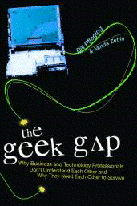Paper or Silicon?
I'm currently working on a writing project with a personal finance expert. Very smart guy. Has an elaborate web site with a webmaster, uses Internet programs and sophisticated software to make investments.
We were at a business meeting recently when a colleague asked him if he was available on a date in a couple of weeks to attend an important conference. He pulled out a datebook the size of a coffee table book, opened it and checked the date to see if he was free.
I couldn't help myself: "You are so low-tech," I said.
"I like having everything in one place," he answered.
The funny thing was, I'd just gotten finished reading a book in which the author described having her purse snatched with her address and date book inside it. Then, faced with a family emergency, she couldn't cancel her work appointments because she'd lost all her contact information.
This, I thought, is the result of having everything in one place. My handheld syncs with the desktop and the desktop (using Airset--great software, check it out, much better than Google Calendar) syncs with the Internet. If information is important, isn't it better to have it in three places, rather than one?
The same issue came up again this afternoon when Bill and I were being interviewed by a Colorado radio station. The host--again, a smart financial guy who's expert at mortgages and uses software in his work--insisted he had to have everything on paper and had actually thrown out several handheld devices given to him over the years.
Why are people so attached to paper date books? I can make an educated guess--because I am a late, if enthusiastic, convert to the handheld myself. It's the same cost/benefit analysis suits conduct all the time when faced with the opportunity to adopt, or reject, a new piece of technology: Will the time it takes me to learn this be worth the advantages I'll get from it? If it seems like the answer is no, then we don't bother. That's why, for years, I clung stubbornly to paper for tracking appointments and contacts.
The only problem is that we suits can't really know what the advantages are of adopting a new technology until we've spent the time to learn how to use it, so to some degree the analysis itself is useless. I never would have hesitated had I known all the different uses I'd find for my (now fourth generation) handheld: it's not only replaced my date book and address book, but also my checking account register and the paper photos of Bill I used to carry (now on display in my handheld whenever I want them). I use it to read magazine articles, listen to recorded short stories, check my e-mail, surf the web... It's obvious that my original cost/benefit analysis was dead wrong.
The problem is that often suits conduct a similar cost/benefit analysis on behalf of their departments, or even their entire companies. When they reject a piece of new technology because they can't see enough of a benefit, they may be dooming themselves to fall behind the competition, if that cost/benefit analysis is equally wrong.
The solution should be to depend on the geeks to help us with that cost/benefit analysis. The problem there is geeks always gravitate toward learning new technology--that's what their jobs are about. From their point of view, adopting the newest and coolest is nearly always worth the trouble.
So what's the answer? I don't know. Just as I don't know why so many people, even technologically sophisticated people, still insist a paper date book is better, or how to convince them that it isn't.
We were at a business meeting recently when a colleague asked him if he was available on a date in a couple of weeks to attend an important conference. He pulled out a datebook the size of a coffee table book, opened it and checked the date to see if he was free.
I couldn't help myself: "You are so low-tech," I said.
"I like having everything in one place," he answered.
The funny thing was, I'd just gotten finished reading a book in which the author described having her purse snatched with her address and date book inside it. Then, faced with a family emergency, she couldn't cancel her work appointments because she'd lost all her contact information.
This, I thought, is the result of having everything in one place. My handheld syncs with the desktop and the desktop (using Airset--great software, check it out, much better than Google Calendar) syncs with the Internet. If information is important, isn't it better to have it in three places, rather than one?
The same issue came up again this afternoon when Bill and I were being interviewed by a Colorado radio station. The host--again, a smart financial guy who's expert at mortgages and uses software in his work--insisted he had to have everything on paper and had actually thrown out several handheld devices given to him over the years.
Why are people so attached to paper date books? I can make an educated guess--because I am a late, if enthusiastic, convert to the handheld myself. It's the same cost/benefit analysis suits conduct all the time when faced with the opportunity to adopt, or reject, a new piece of technology: Will the time it takes me to learn this be worth the advantages I'll get from it? If it seems like the answer is no, then we don't bother. That's why, for years, I clung stubbornly to paper for tracking appointments and contacts.
The only problem is that we suits can't really know what the advantages are of adopting a new technology until we've spent the time to learn how to use it, so to some degree the analysis itself is useless. I never would have hesitated had I known all the different uses I'd find for my (now fourth generation) handheld: it's not only replaced my date book and address book, but also my checking account register and the paper photos of Bill I used to carry (now on display in my handheld whenever I want them). I use it to read magazine articles, listen to recorded short stories, check my e-mail, surf the web... It's obvious that my original cost/benefit analysis was dead wrong.
The problem is that often suits conduct a similar cost/benefit analysis on behalf of their departments, or even their entire companies. When they reject a piece of new technology because they can't see enough of a benefit, they may be dooming themselves to fall behind the competition, if that cost/benefit analysis is equally wrong.
The solution should be to depend on the geeks to help us with that cost/benefit analysis. The problem there is geeks always gravitate toward learning new technology--that's what their jobs are about. From their point of view, adopting the newest and coolest is nearly always worth the trouble.
So what's the answer? I don't know. Just as I don't know why so many people, even technologically sophisticated people, still insist a paper date book is better, or how to convince them that it isn't.



0 Comments:
Post a Comment
Subscribe to Post Comments [Atom]
<< Home